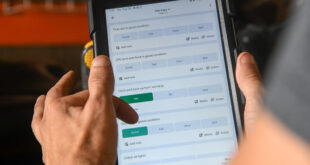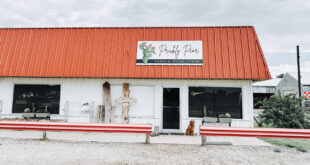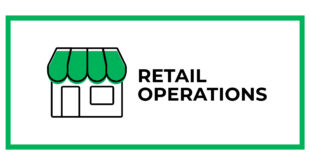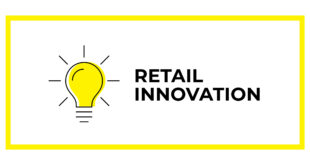Christian Herrick is the chief executive officer of Randy’s Do It Best Hardware, which has two stores based in Timberville, Virginia. Herrick’s leadership journey has covered a lot of territory, taking him from missionary work in Alaska to a service manager job in Las Vegas. When he and his wife Rachel returned to her home in Timberville, VA, after the birth of their first child, Christian took a job as a merchandiser in her dad’s hardware store, Randy’s Do It Best. And the rest, as they say, is history.
Painting the Vision
“When I was a missionary in the Yukon Territory, I learned a lot about leadership. First, you don’t get to choose who you work with, so you have to find ways to work together. You also have train people quickly to be missionaries. I would be in charge of a whole group and would have to keep them motivated and help them see their potential by painting the vision of what they could achieve.”
“We have a young group of managers and team leaders, and we call ourselves the Lost Boys. We say we’re never going to grow up. They are all young guys in their early to mid-20s, and I have hired and trained them. Most come from a construction or mechanic-style, hardworking background. None had any real retail or management experience, but they are excelling really well.”
“When I would interview [my employees], I would tell them up front that I’m young and inexperienced, but I’m passionate and I’m going to make this work. The ones who didn’t respond well to this weren’t hired, but the ones who said, “Let’s go for it,” were the ones we hired and who are doing great. We were profitable very quickly.”
***
Hire for Attitude
“We have this phrase in Mormonism: “Who do you want on your wagon train?” It comes from our history of being pioneers. That’s who we try to hire—people who are friendly, outgoing, honest, hardworking individuals, regardless of their past experience. They’re the kind of people who you would want to be your neighbor.”
***
Empathy
“I spent a lot of my teen and early adult years working in corporate retail environments, and I’ve talked to our employees about what it’s like. There are a number of higher paying jobs available, and we’ve had chain retailers come into the area who pay 50 percent more than we do. Wal-Mart and Hobby Lobby start at $15 per hour. I’ve also been in jobs where the pay is better, but money is not the end-all-be-all. We can’t pay the same wages as the big-box retailers, but we’re not going to have the same crazy schedule requirements they do. We’re going to be way more flexible with scheduling. I also started at the bottom of this company and worked my way up. Knowing their struggles and being empathetic is crucial to leading them effectively.”
“We’re a very family-oriented company. Sometimes I hear that from other independent retailers, and I think it’s disingenuous many times, especially when they expect their people to work every holiday and there are blackout dates for time off. I think that’s talking out of both sides of your mouth. If you’re going to be family-oriented, you have to be flexible. If we ask you to work the day after Thanksgiving, we won’t ask you to work the day after Christmas. If your child is sick or if your mom is sick, don’t hesitate to call in. That is way more important than being here at the hardware store.”
***
Early Mistakes
“When I first opened our Bridgewater store in 2011, at times it was overwhelming. I was a new manager and didn’t know what the expectations were. When I would become overwhelmed, I would go into my office, shut the door and isolate myself from the rest of my team. This bred distrust between the team and myself. It took some hard conversations with my team leader (assistant manager), and he told me, “I’m sure you’re working on something important back there, but people are talking and they would like to see you out here.” He called me out and I’m glad he did. I needed to be more involved with my staff and be more transparent. We still had a profitable store and we were doing great, but I really regret that time period.”
***
Mentors Along the Way
“I don’t really buy into a canned definition of leadership. When I envision a leader, I envision Randy [Randy Andes, owner and Christian’s father-in-law]. He has been crucial to my development as a leader. I came to the store with an aggressive, cocky, abrasive, bossy style. and Randy showed me how to lead people by getting them to do what you want them to by making them want to do it. He’s a brilliant manager, and it’s so natural and intuitive to him that he doesn’t even really know he’s doing it. Everyone who works for him respects him and loves him.”
“When I see Randy interacting with employees, I take notes. He has a calm way of going about what he does. He’s not abrasive or confrontational at all, and has taught me by his example.”
“I have also learned a lot about leadership from my parents. My father is a very kind-hearted, soft-spoken man who has also taught me to temper my aggressiveness. Watching him lead our congregation has had a great impact on my leadership style. My mother has been my pocket ace and has always been my business mentor. She taught me that when you find someone valuable, even if you don’t have a spot for them, do whatever it takes to get them and keep them. Create a spot for them. When we hired my team leader in Bridgewater, there wasn’t a position available, but I saw potential, and I found a way to hire him. This is crucial to finding and keeping good people.”
 Hardware Retailing The Industry's Source for Insights and Information
Hardware Retailing The Industry's Source for Insights and Information








